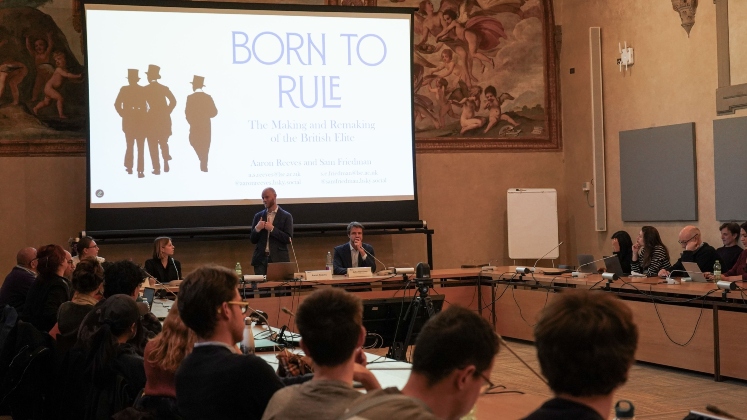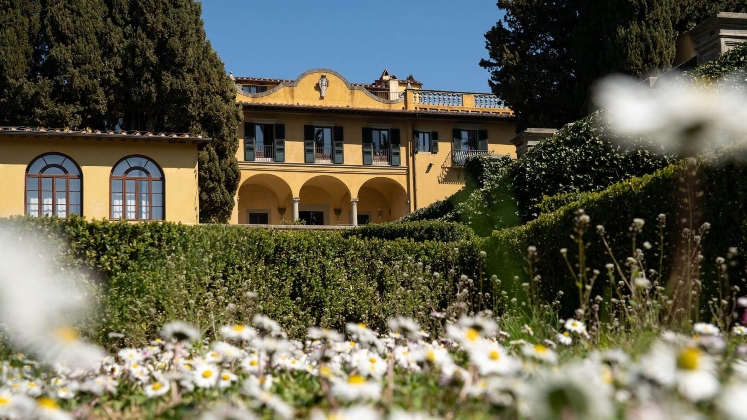Prof. Aaron Reeves is a sociologist with interests in public health, culture, and political economy. His research is focused on understanding the causes and consequences of social and economic inequality across countries. His most recent book (with Prof. Sam Friedman) entitled Born to Rule: The Making and Remaking of the British Elite is a meticulous analysis of the British elite from the Victorian era to today: who gets in, how they get there, what those born in privilege like and look like, where they go to school, and what politics they perpetuate.
 He shares his experience after returning from a short visit in Florence where he spent time with Prof. Juho Härkönen and local faculty at EUI ↓
He shares his experience after returning from a short visit in Florence where he spent time with Prof. Juho Härkönen and local faculty at EUI ↓
Why did you want to go to EUI and what did you work on during your visit?
There were two main reasons for my visit to the EUI. Prof Härkönen had graciously invited me to participate in the Florence Population Studies group and I wanted to get feedback on some preliminary research that I was conducting that was focussed on mortality rates over the long-run. This was a wonderful opportunity to get feedback from a group of researchers who are thinking about related issues from a variety of perspectives.
Alongside this, although I had visited the EUI before, I did have time to connect with all of the relevant people that I would have wanted to connect with. The CIVICA award gave me a longer period to meet with and talk to relevant colleagues.
Could you tell us a bit more about how this visit fits with the rest of your research?
One key area of my work is trying to understand (a) what has happened to health inequalities in England and Wales since 1850 and (b) why health inequalities have changed, assuming that they have. This project had reached an important phase. We had collected the data and we had produced some preliminary results but we had not yet finished the analysis for the project and we were still uncertain about a number of analytical choices.
This research visit gave me a chance to present some of those potential choices. It also allowed me to explore possible connections with academics who are working on related issues.
What attracted you to this area of research?
I am intrigued by a few different puzzles around the topic of health inequalities. The first is that we actually know surprisingly little about what has happened to health inequalities over time. Discovering these trends is important because it will help us understand the underlying causes of health inequalities. The second is that while we do not have very good data on health inequalities over the very long run (say the last 200 years) we do have some information about health inequalities over the last few decades (since the 1980s).
This data suggests that health inequalities have not changed very much at all. This is surprising because over the course of the twentieth century British society (but a number of other contexts too) experienced a number of profound changes which should have altered the extent to which people are exposed to harmful social determinants of health (e.g., poverty). My research is in different ways interested in trying to understand these puzzles better.
 How do you hope your research will contribute to better society and policy outcomes?
How do you hope your research will contribute to better society and policy outcomes?
My hope is that this work will allow us to develop more empirically robust strategies for addressing health inequalities, especially because it seems that many of the big changes we were hoping would reduce health inequalities have not always delivered on the scale we might have hoped. One problem with the evidence that we have now is that it often only provides a very limited snapshot of how certain policy interventions affect health and wellbeing. We need to take a longer view, one that covers a larger part of the life course as well as considers major changes in the political economy of a given society.
What is your main take away from your time at EUI?
My main takeaways are two-fold. The first concerns the feedback and advice I received while visiting the EUI. I was able to get two key insights into core problems that I was working on related to this project – as well as some opportunities to consider those issues in other fora, such as future workshops. On top of this, I was able to begin conversations that I hope will lead to future collaborations flowing from the work that we are doing on this project. In this respect, I was able to get exactly what I wanted out of the trip.
Do you have any advice for people who are thinking about applying to CIVICA funding but haven’t done so yet?
My experience suggests that the most fruitful conversations about our work happen over slightly extended periods of time, often in small groups, when you are able to really think through a problem. The Civica scheme allowed me the chance to engage in exactly those kinds of conversations and it was well worth it.
Photo credits: EUI